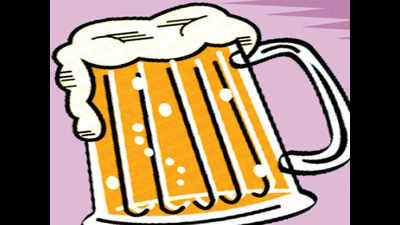- News
- City News
- kolkata News
- Beer-drinkers attract mosquitoes, claim studies
Trending
This story is from November 11, 2019
Beer-drinkers attract mosquitoes, claim studies
Think twice before gulping down that one pint too many this dengue season. Because, the beer you are guzzling is likely to make you more attractive to virus-bearing mosquitoes — if studies are to be believed.

Representative image
KOLKATA: Think twice before gulping down that one pint too many this dengue season. Because, the beer you are guzzling is likely to make you more attractive to virus-bearing mosquitoes — if studies are to be believed.
Even an ingestion of only 350ml of beer can make one more vulnerable to mosquito bites, found a study by the department of biodefence medicine at the Toyama Medical and Pharmaceutical University in Japan.
Thierry Lefevre of the French National Centre for Scientific Research, too, got similar results in a study.
Not only dengue, those winged devils attracted by beer-drinkers can cause diseases like malaria, chikungunya and zika as well.
According to entomologists, even the carbon dioxide that fizzes out when a beer bottle is opened can attract mosquitoes toward the drinker. Mosquitoes use CO2 to get close to their prey. They can follow a stream of carbon dioxide from more than 100 feet away.
According to Amiya Kumar Hati, former director of the School of Tropical Medicine, Kolkata, “Those who sweat more, attract more mosquitoes. There are certain chemicals in human sweat that attract the insects more.” Indeed. Lactic acid, uric acid, ammonia and other substances that come out with human sweat attract mosquitoes. Also, mosquitoes land more on people with blood type O and in an advanced stage of pregnancy. And, of course, those exhaling more carbon dioxide get more mosquito bites.
“There have been studies on beer-drinkers attracting more mosquitoes and we are not ruling out any possibility, but there is nothing very conclusive to decide any public health action point based on it,” says Pritam Roy, World Health Organization’s West Bengal coordinator.
“One of the studies show that the percentage of mosquitoes landing on a person significantly increased after beer ingestion compared with before ingestion. However, ethanol content in sweat and skin temperature did not show any correlation between alcohol ingestion and mosquito landings. What is more conclusive is that high beer intake may increase the risk of liver failure, pancreatic disorders, cancers and other metabolic syndromes,” adds Roy.
Even an ingestion of only 350ml of beer can make one more vulnerable to mosquito bites, found a study by the department of biodefence medicine at the Toyama Medical and Pharmaceutical University in Japan.
Thierry Lefevre of the French National Centre for Scientific Research, too, got similar results in a study.
Not only dengue, those winged devils attracted by beer-drinkers can cause diseases like malaria, chikungunya and zika as well.
But what exactly makes a beer guzzler more palatable to mosquitoes? There is no clear answer yet. Maybe it’s the increased body temperature, or increased sweating, or an increased amount of carbon dioxide exhaled by the drinker, say scientists.
According to entomologists, even the carbon dioxide that fizzes out when a beer bottle is opened can attract mosquitoes toward the drinker. Mosquitoes use CO2 to get close to their prey. They can follow a stream of carbon dioxide from more than 100 feet away.
According to Amiya Kumar Hati, former director of the School of Tropical Medicine, Kolkata, “Those who sweat more, attract more mosquitoes. There are certain chemicals in human sweat that attract the insects more.” Indeed. Lactic acid, uric acid, ammonia and other substances that come out with human sweat attract mosquitoes. Also, mosquitoes land more on people with blood type O and in an advanced stage of pregnancy. And, of course, those exhaling more carbon dioxide get more mosquito bites.
“There have been studies on beer-drinkers attracting more mosquitoes and we are not ruling out any possibility, but there is nothing very conclusive to decide any public health action point based on it,” says Pritam Roy, World Health Organization’s West Bengal coordinator.
“One of the studies show that the percentage of mosquitoes landing on a person significantly increased after beer ingestion compared with before ingestion. However, ethanol content in sweat and skin temperature did not show any correlation between alcohol ingestion and mosquito landings. What is more conclusive is that high beer intake may increase the risk of liver failure, pancreatic disorders, cancers and other metabolic syndromes,” adds Roy.
End of Article
FOLLOW US ON SOCIAL MEDIA










